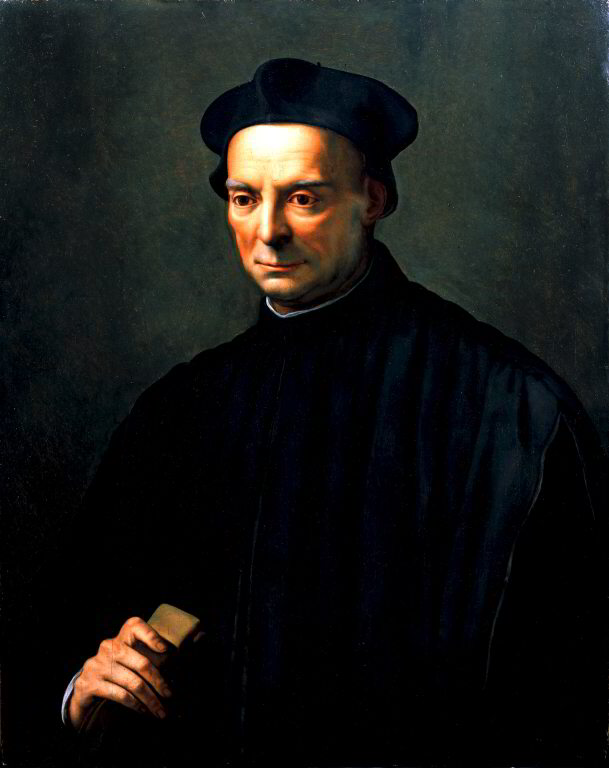Niccolo Machiavelli najznámejšie citáty
Niccolo Machiavelli Citáty o ľuďoch
„…v ľude je tým menej zbožnosti, čím bližšie k sídlu rímskej cirkvi býva.
Kniha I, Kapitola 12“
Potvrdené výroky, Vladár
Niccolo Machiavelli Citáty o zlu
Niccolo Machiavelli citáty a výroky
„Vladárovi nikdy nechýba legitímny dôvod na to, aby porušil svoj sľub.
Kapitola 18“
Potvrdené výroky, Vladár
„A preto všetci ozbrojení proroci zvíťazili a všetci neozbrojení proroci boli zničení.
Kapitola 6“
Potvrdené výroky, Vladár
„V politice, kde není odvolávacího soudu, soudí člověk podle výsledku.“
Varianta: V politike, kde nie je odvolávací súd, súdi človek podľa výsledku.
Niccolo Machiavelli: Citáty v angličtine
Originál: (it) Il tempo si caccia innanzi ogni cosa, e può condurre seco bene come male, male come bene.
Zdroj: The Prince (1513), Ch. 3, as translated by M. K. Marriot (1908)
Originál: (it) Conchiudo adunque, che, variando la fortuna, e gli uomini stando nei loro modi ostinati, sono felici mentre concordano insieme, e come discordano sono infelici. Io giudico ben questo, che sia meglio essere impetuoso, che rispettivo, perchè la Fortuna è donna; ed è necessario, volendola tener sotto, batterla, ed urtarla; e si vede che la si lascia più vincere da questi che da quelli che freddamente procedono.
Zdroj: The Prince (1513), Ch. 25, as translated by RM Adams
After they withdrew, innumerable serious and majestic personages appeared, who seemed to be sitting in a senate-house and dealing with the most important affairs of state. Among them he saw Plato, Aristotle, Seneca, Plutarch, Tacitus, and others of similar character; but he was told at the same time that those venerable personages, notwithstanding their appearance, were the damned, and the souls rejected by heaven, for Sapientia huius saeculi, inimica est Dei.. After this, he was asked to which of the groups he would choose to belong; he answered that he would much rather be in Hell with those great geniuses, to converse with them about affairs of state, than be condemned to the company of the verminous scoundrels that he had first been shown.
This account of Machiavelli's "Dream" was not published until a century after his death, in Etienne Binet's Du salut d'Origene (1629).
There is an earlier but more oblique reference in a letter written by Giovambattista Busini in 1549: "Upon falling ill, [Machiavelli] took his usual pills and, becoming weaker as the illness grew worse, told his famous dream to Filippo [Strozzi], Francesco del Nero, Iacopo Nardi and others, and then reluctantly died, telling jokes to the last.".
The "Dream" is commonly condensed into a more pithy form, such as "I desire to go to hell, and not to heaven. In the former place I shall enjoy the company of popes, kings, and princes, while in the latter are only beggars, monks, hermits, and apostles".
Disputed
Zdroj: Blessed are the poor, for theirs is the kingdom of heaven
Zdroj: The wisdom of this world is the enemy of God
Zdroj: [Estienne, Binet, Du Salut D'Origene, 1629, Paris, Sebastien Cramoisy, 359-361, French, https://books.google.com/books?id=1yjDNfQatgQC&q=Plutarque&f=false]. Original French: On arrive à ce detestable poinct d'honneur, où arriva Machiauel sur la fin de sa vie: car il eut cette illusion peu deuant que rendre son esprit. II vit un tas de pauures gens, comme coquins, deschirez, affamez, contrefaits, fort mal en ordre, & en assez petit nombre, on luy dit que c'estoit ceux de Paradis, desquels il estoit ecrit: "Beati pauperes, quoniam ipsorum est regnum cælorum". Ceux-cy estans retirez, on fit paroistre vn nombre innombrable de personnages pleins de grauité & de majesté, on les voyoit comme un Senat, où on traitoit d'affaires d'estat, & fort serieuses, il entrevid Platon, Aristote, Seneque, Plutarque, Tacite, & d'autres de cette qualité. II demanda qui estoient ces Messieurs-là si venerables, on luy dit que c'estoient les damnez, & que c'estoient des ames reprouuées du Ciel, "Sapientia huius sæculi, inimica est Dei". Cela estant passé, on luy demanda desquels il vouloit estre. II respondit, qu'il aymoit beaucoup mieux estre en enfer auec ces grands esprits, pour deuiser auec eux des affaires d'Estat, que d'estre auec cette vermine de ces belistres qu'on luy auoit fait voir.
Zdroj: [Lettere di Giovambattista Busini a Benedetto Varchi, Italian, Giovanni Battista, Busini, Gaetano Milanese (ed.), Florence, Felice le Monnier, 1860, 84-85, https://books.google.com/books?id=d5EKAAAAIAAJ&q=%22queste+pillole%22#v=snippet&q=%22queste%20pillole%22&f=false]. Original Italian: Ammalato cominciò a pigliar di queste pillole, ed a indebolire ed aggravar nel male; onde raccontò quel tanto celebrato sogno a Filippo, a Francesco del Nero ed a Iacopo Nardi, e ad altri, e cosi si morì malissimo contento, burlando.
Zdroj: [The Last Words (real and Traditional) of Distinguished Men and Women, Frederic Rowland, Marvin, 178, Revell, 1902, https://books.google.com/books?id=SrEVAAAAYAAJ&pg=PA178&dq=Hell+Heaven+%22enjoy+the+company+of+popes%22&hl=en&sa=X&ved=0ahUKEwj7x9SZzdDJAhUE-2MKHaO_CBkQ6AEIHDAA#v=onepage&q&f=false]
Originál: (it) Molti si sono immaginate Repubbliche e Principati, che non si sono mai visti nè cognosciuti essere in vero; perchè egli è tanto discosto da come si vive, a come si doveria vivere, che colui che lascia quello che si fa per quello che si doveria fare, impara piuttosto la rovina, che la preservazione sua.
Zdroj: The Prince (1513), Ch. 15; translated by W. K. Marriot
Originál: (it) E però un principe savio deve pensare un modo per il quale i suoi cittadini sempre ed in ogni modo e qualità di tempo abbiano bisogno dello Stato di lui, e sempre poi gli saranno fedeli.
Zdroj: The Prince (1513), Ch. 9; translated by W. K. Marriot
